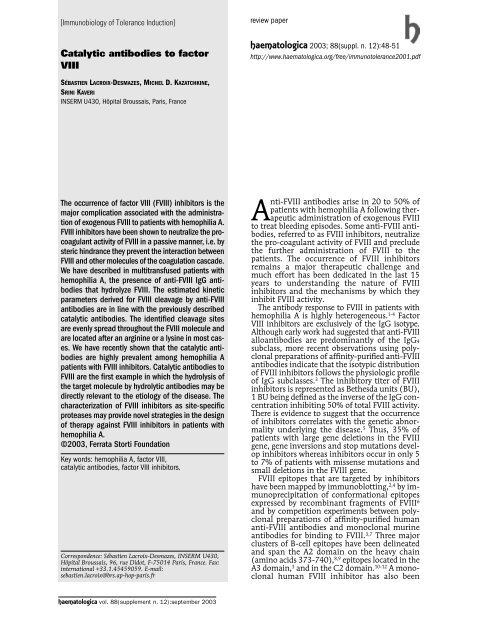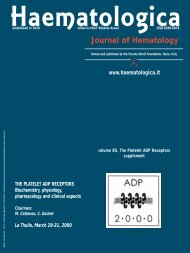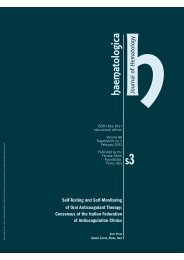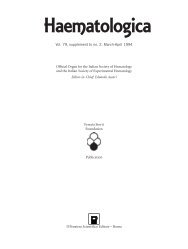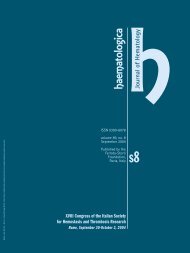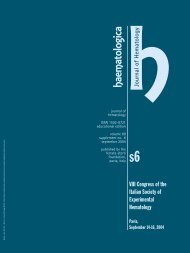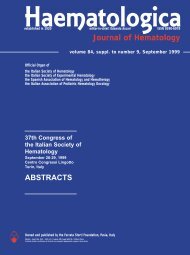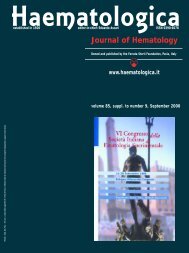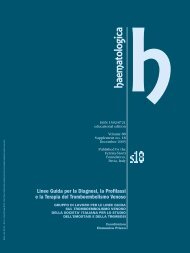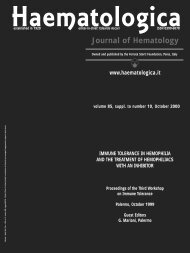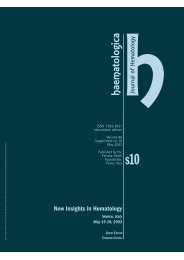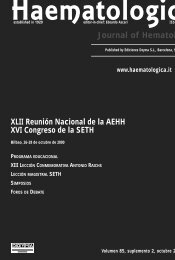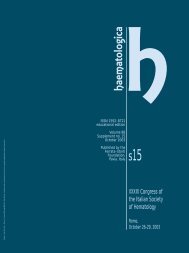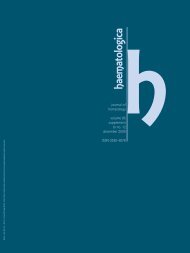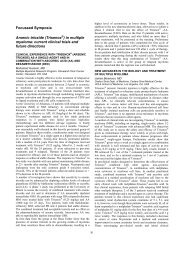[Immunobiology of Tolerance Induction]review paperCatalytic antibodies to factorVIIIhaematologica <strong>2003</strong>; 88(suppl. n. 12):48-51http://www.haematologica.org/free/immunotolerance2001.pdfSÉBASTIEN LACROIX-DESMAZES, MICHEL D. KAZATCHKINE,SRINI KAVERIINSERM U430, Hôpital Broussais, Paris, FranceThe occurrence of factor VIII (FVIII) inhibitors is themajor complication associated with the administrationof exogenous FVIII to patients with hemophilia A.FVIII inhibitors have been shown to neutralize the procoagulantactivity of FVIII in a passive manner, i.e. bysteric hindrance they prevent the interaction betweenFVIII and other molecules of the coagulation cascade.We have described in multitransfused patients withhemophilia A, the presence of anti-FVIII IgG antibodiesthat hydrolyze FVIII. The estimated kineticparameters derived for FVIII cleavage by anti-FVIIIantibodies are in line with the previously describedcatalytic antibodies. The identified cleavage sitesare evenly spread throughout the FVIII molecule andare located after an arginine or a lysine in most cases.We have recently shown that the catalytic antibodiesare highly prevalent among hemophilia Apatients with FVIII inhibitors. Catalytic antibodies toFVIII are the first example in which the hydrolysis ofthe target molecule by hydrolytic antibodies may bedirectly relevant to the etiology of the disease. Thecharacterization of FVIII inhibitors as site-specificproteases may provide novel strategies in the designof therapy against FVIII inhibitors in patients withhemophilia A.©<strong>2003</strong>, Ferrata Storti FoundationKey words: hemophilia A, factor VIII,catalytic antibodies, factor VIII inhibitors.Correspondence: Sébastien Lacroix-Desmazes, INSERM U430,Hôpital Broussais, 96, rue Didot, F-75014 Paris, France. Fax:international +33.1.45459059. E-mail:sebastien.lacroix@brs.ap-hop-paris.frAnti-FVIII antibodies arise in 20 to 50% ofpatients with hemophilia A following therapeuticadministration of exogenous FVIIIto treat bleeding episodes. Some anti-FVIII antibodies,referred to as FVIII inhibitors, neutralizethe pro-coagulant activity of FVIII and precludethe further administration of FVIII to thepatients. The occurrence of FVIII inhibitorsremains a major therapeutic challenge andmuch effort has been dedicated in the last 15years to understanding the nature of FVIIIinhibitors and the mechanisms by which theyinhibit FVIII activity.The antibody response to FVIII in patients withhemophilia A is highly heterogeneous. 1-4 FactorVIII inhibitors are exclusively of the IgG isotype.Although early work had suggested that anti-FVIIIalloantibodies are predominantly of the IgG4subclass, more recent observations using polyclonalpreparations of affinity-purified anti-FVIIIantibodies indicate that the isotypic distributionof FVIII inhibitors follows the physiologic profileof IgG subclasses. 3 The inhibitory titer of FVIIIinhibitors is represented as Bethesda units (BU),1 BU being defined as the inverse of the IgG concentrationinhibiting 50% of total FVIII activity.There is evidence to suggest that the occurrenceof inhibitors correlates with the genetic abnormalityunderlying the disease. 5 Thus, 35% ofpatients with large gene deletions in the FVIIIgene, gene inversions and stop mutations developinhibitors whereas inhibitors occur in only 5to 7% of patients with missense mutations andsmall deletions in the FVIII gene.FVIII epitopes that are targeted by inhibitorshave been mapped by immunoblotting, 2,4 by immunoprecipitationof conformational epitopesexpressed by recombinant fragments of FVIII 6and by competition experiments between polyclonalpreparations of affinity-purified humananti-FVIII antibodies and monoclonal murineantibodies for binding to FVIII. 3,7 Three majorclusters of B-cell epitopes have been delineatedand span the A2 domain on the heavy chain(amino acids 373-740), 8,9 epitopes located in theA3 domain, 3 and in the C2 domain. 10-12 A monoclonalhuman FVIII inhibitor has also beenhaematologica vol. 88(supplement n. 12):september <strong>2003</strong>
IV International Workshop on Immune Tolerance in Hemophilia49shown to recognize an epitope in the C1 domainof FVIII. 13Most FVIII inhibitors described to date neutralizethe pro-coagulant activity of FVIII byblocking functional epitopes by steric hindrance.FVIII inhibitors that bind to the heavy-chain ofFVIII prevent the cleavage of FVIII by thrombin orby activated factor X and the subsequent activationof FVIII. 4,8,14,15 Light-chain specific inhibitorsprevent the interaction of FVIII with activatedfactor IX, 16 or phospholipids and/or von Willebrandfactor (vWF). 10,17-19 A second category ofFVIII inhibitors bind to neo-epitopes formed bythe association of FVIII and vWF, thus reducingthe dissociation rate of FVIII from vWF. 20 In additionto FVIII inhibitors, the plasma of inhibitorpositivepatients contains anti-FVIII antibodiesdirected to non-functional determinants of themolecule. 2,3 Such antibodies, together with antibodiesspecific for functional epitopes, may beinvolved in the formation of immune complexesin multitransfused patients with haemophiliaA 21 and result in an accelerated in vivo clearanceof FVIII. 3 Altogether the latter mechanisms arepassive mechanisms of inhibition of FVIII thatare mediated by the passive binding of antibodiesto the molecule. We wondered whether someanti-FVIII antibodies may neutralize FVIII in anactive manner, may be endowed with enzymaticactivity and behave as catalytic antibodies.The concept of catalytic antibodies was firstintroduced in the early 1940's by Linus Pauling. 22At the time, Pauling hypothesized that if the antigenbinding sites of immunoglobulins are randomlygenerated, which was later to be confirmed,then the possibility exists that some ofthem may structurally mimic the active site ofenzymes and thus be endowed with catalyticactivity. It was not until the advent of hybridomatechnology in the 1970's that it became possibleto confirm Pauling's hypothesis formally. In1986, Tramontano et al. demonstrated that it ispossible to raise monoclonal murine antibodiesendowed with esterase activity upon activeimmunization of mice using an analog of thetransition state structure of the ester bond cleavagechemical reaction. In humans the presenceof catalytic antibodies with hydrolytic activity hassince been demonstrated in several instances. In1989, S. Paul et al. purified and characterizedantibodies capable of cleaving the vasoactiveintestinal peptide from the plasma of patientswith asthma. 23 Later, antibodies able to hydrolyzeDNA and thyroglobulin were purified from theplasma of patients with lupus erythematosus andof patients with Hashimoto's thyroiditis. 24,25Antibodies able to hydrolyze and activate prothrombininto thrombin were found amongmonoclonal light chains of patients with multiplemyeloma. 26 It is interesting to note that innone of these pathologic manifestations is thehydrolysis of the target molecules directly relevantto the clinical manifestations. We wonderedwhether, if some of the anti-FVIII antibodies ofpatients with hemophilia A are able to hydrolyzethe molecule, a direct correlation between theoccurrence of catalytic antibodies and the clinicalmanifestations could be demonstrated for thefirst time.IgG were isolated from the plasma of patientswith severe hemophilia A who had developedhigh titers of FVIII inhibitors following perfusionof therapeutic FVIII. IgG were purified from plasmaby ammonium sulfate precipitation, followedby chromatography on protein G. In our firstseries of experiments, anti-FVIII antibodies werefurther purified by affinity-chromatography on ahuman FVIII-coupled sepharose matrix. RadiolabeledFVIII presented a characteristic migrationprofile, with protein bands ranging from 300 to70 kD. Incubation of FVIII in the presence ofanti-FVIII IgG of 2 of 3 patients resulted in thehydrolysis of high molecular weight bands andappearance of bands of molecular weight lowerthan 70 kD, whereas incubation of FVIII withIgG of a third patient did not result in FVIIIhydrolysis. 27 Similarly, incubation of FVIII withnormal polyclonal human IgG (IVIg, Sandoglobulin®)and with a control human monoclonalIgG directed to cytomegalovirus did not result inFVIII proteolysis.The following lines of evidence confirmed thatFVIII hydrolysis was not due to contaminatingproteases: 27 (i) anti-FVIII IgG from patients BO1and WA1 exhibited different kinectics of FVIIIhydrolysis and different digestion patterns,whereas that of patient CH1 did not cleave FVIII,suggesting that FVIII hydrolysis is mediated bythe variable regions of antibodies; (ii) the catalyticactivity to FVIII was co-eluted with anti-FVIII IgG, whereas IgG not retained on the FVIIImatrix did not cleave FVIII; (iii) removal of IgGfrom the preparations of affinity-purified anti-FVIII antibodies by chromatography on protein Gresulted in the complete loss of the hydrolyzingcapacity; (iv) co-incubation of FVIII and anti-FVIII IgG in the presence of several proteaseinhibitors (i.e., E-64, pepstatin, leupeptine) didnot prevent FVIII hydrolysis; (v) size-exclusionchromatography of urea-treated affinity-purifiedanti-FVIII IgG yielded a major peak that wasdevoid of contaminants and retained the catalyticactivity to FVIII; (vi) F(ab')2 fragments preparedby pepsin digestion of affinity-purifiedanti-FVIII IgG were able to cleave FVIII, furthersuggesting that FVIII hydrolysis is mediated bythe variable regions of the antibodies.More recently, we have purified IgG from theplasma of 24 patients with severe hemophilia Aand FVIII inhibitors. 28 The patients' IgG were allsubjected to size-exclusion chromatography inthe presence of 8 M urea followed by renaturationby extensive dialysis. Significant hydrolyticactivity was detected among IgG of 13 patientsout of 24. In contrast, IgG from 4 patients withsevere hemophilia A without detectable inhibitordid not cleave FVIII, suggesting a correlationbetween the presence of FVIII-hydrolyzing anti-haematologica vol. 88(supplement n. 12):september <strong>2003</strong>


